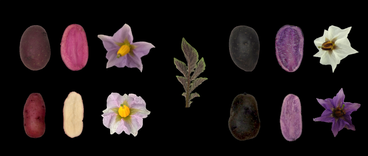A systems biology approach to understanding anthocyanin biosynthesis and regulation in potato
National Science Foundation National Plant Genome Initiative Postdoctoral Research Fellowship In Biology
8/12 - 7/15 | PI: Cory D. Hirsch | Award#: 1202724
Anthocyanins, the purple and red pigments found in plants, have numerous health benefits including a high anti-oxidant content with human health benefits. The scientific goal of the research was to investigate anthocyanin production at the genetic, biochemical, molecular, and systems level in potato, a crop species that is emerging as an important component of the 21st century world food needs. This project coupled classical plant breeding approaches with modern technology enabled genome-wide approaches to generate and integrate multiple data types to provide a genome-scale understanding of the mechanisms by which genes govern anthocyanin production in potato.
Training objectives include classical breeding, biochemistry, quantitative genetics and plant genomics. Broader impacts include capacity-building and advanced training for students from the United States to engage in interdisciplinary research in plant improvement and associated sciences such as physiology, quantitative genetics, and computational biology.
